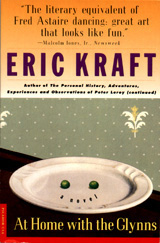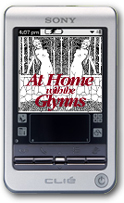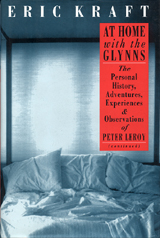
YOU CAN READ
THE FIRST HALF OF
THE BOOK
(21 CHAPTERS)
HERE,
ONLINE,
OR,
FOR MAXIMUM PORTABILITY
AND CONVENIENCE
WHEN READING
ON THE BEACH
OR
IN THE TUB,
YOU CAN BUY THE
PICADOR USA
PAPERBACK EDITION AT
AMAZON.COM
OR
BARNES&NOBLE.COM
OR
YOU CAN DOWNLOAD
THE COMPLETE TEXT
AS AN
eBOOK
AND
READ IT ON A PDA.

|
Chapter 21
Trust
 EARLY
A YEAR PASSED. Over the course of that year’s Saturday visits to
the Glynns, a year of drawing lessons and contest entries, I got to know
Andy and Rosetta. I learned quite a lot about their remarkable lives,
from them, in their own words, and what I learned directly from them taught
me how much of what I had thought I knew about them—that is, what I’d learned
from my parents and their friends—was wrong. EARLY
A YEAR PASSED. Over the course of that year’s Saturday visits to
the Glynns, a year of drawing lessons and contest entries, I got to know
Andy and Rosetta. I learned quite a lot about their remarkable lives,
from them, in their own words, and what I learned directly from them taught
me how much of what I had thought I knew about them—that is, what I’d learned
from my parents and their friends—was wrong.
To be completely accurate, I learned about the Glynns
in Rosetta’s words. Since I was as curious a fellow then as I am now, I
was always asking her questions. I would ask her about anything that
intrigued me, and she would answer me, in her fashion. By that I
mean that she would always tell me something in response to my questions,
and what she told me was always in some way related to what I wanted to
know, but I didn’t always realize at the time what that relationship was.
I would ask her the simplest sort of question, and she would use it as
a springboard for a leap into the past. It might be something about
one of the contests. I might ask: “Do you think I should say anything
about the fact that prunes have pits?” or “If you can pack as much as they
claim into these suitcases, won’t they be pretty heavy?”
“Ah, prunes!” she would say, and drop her pencil
on the table as if something about prunes made her wistful and dreamy,
or she would throw her hands in the air and shout, “Suitcases! Luggage!
Baggage!” She would sit back and look upward, and she would begin
to talk, and after a few words I would understand that she had heard my
question as “Tell me about the first time you fell in love” or “Please
describe the methods of farming employed in your village when you were
a girl.”
Often, she would call for a glass of slivovitz,
and I soon learned where it was kept. I would get her tiny tumbler,
set it in front of her, fill it, and set the bottle beside the glass, without
comment. While Rosetta talked, she sipped. She refilled her
glass absentmindedly, and she would go on and on about the dark eyes and
reedy voice of her first love or the many aspects of spreading manure that
required the grudging labor of a young girl, and then, at a point that
I rarely saw coming, the slivovitz would take its toll, her words would
begin to run together, and she would sigh and return to the prunes or the
luggage or whatever had prompted my question, and tell me that “every happy
moment has its pit” or that “when you get to be my age all your suitcases
are heavy,” and the story would be at an end.
(As a boy, I tried, for a while, perhaps a year
or so before the time when I was hanging around with the Glynns, to get
interested in photography, but my interest had to contend with and was
eventually overcome by a repulsion induced by a lingering association of
photography with sickness, and, specifically, with vomit. That association
was brought on by the fact that a neighbor—or my mother, or some school
chum—had brought me, as a diversion while I was sick with the flu, a stack
of library books that included a mildewed copy of a book on photography.
When I opened the book it exhaled an odor like the stink that drifts from
dark alleys where garbage has been left to ripen. Manfully, I made
the effort to read it, or at least leaf through it, since it was a gift
and represented affection and concern. I forced myself to overcome
my revulsion. I read the book and, to show how grateful I was for
the thought behind the gift, labored for a while to become a photographic
adept. In the effort, I acquired some basic equipment, turned a portion
of my parents’ cellar into a darkroom, and made enough unsatisfactory prints
to learn that I would never be much of a photographer. However, along
the way, I wrung from the hobby its best metaphoric experiences: the processes
of development and printing. After I had developed some understanding
of the negative of an image as the inverse of experience and of the positive
print of an image gradually appearing on a blank sheet of photographic
paper as the revelation of the detailed if often poorly focused truth in
what may at first seem a blank and nearly meaningless experience, emerging
slowly, as if reluctantly, as if it were being teased, forced, or seduced
into revealing itself by the skill, will, or art of the photographer, I
felt that I had sufficiently acknowledged the generosity of the gift and
sufficiently justified my investment to be free to abandon the effort,
and so I did, to the delight of my mother, who found it smelly.)
Like a photographic print in a developing bath in a darkroom, my understanding
of some of the things Rosetta told me developed slowly as the seasons came
around again to early fall. Two impressions stood out from all the
others: that Rosetta seemed to have been waiting for me, her proper audience,
and that life for a great many people whom I had never met had been far
darker, more disappointing, and frightening than it had been for the people
who were forever telling me about the night the Nevsky mansion burned.
I should admit, I suppose, in the interest of frankness,
that I never did very well at those contests. I couldn’t seem to
come up with much of anything that provided the shock of the new, and my
expressions of hope never really went beyond the hope that I would win.
To my mind, the closest I came was my entry for Troubled Titan Peas: “Troubled
Titan Brand Baby Peas are my first choice for stocking a family fallout
shelter because they’re ready in a jiffy, they taste much better than lima
beans, and they can be fun to play with if you don’t have any other way
to pass the time, which could be a problem in a fallout shelter.”
This entry became something of a joke in the Glynn
household. Margot and Martha collapsed in giggles as soon as they
heard it, and Andy said, almost at once, “That’s just what I’ve been looking
for! I’ve never had a good name for it before! I’ve needed
a kind of general-purpose phrase for those time-consuming little chores
that must be repeated and repeated throughout a person’s life without ever
being finished! Like cleaning rollers! Buying cigarettes!
Cleaning leaves from the gutters! Changing the damned oil in the
damned car! We’re always doing that—stuff—and then one day we discover
that we’ve wasted quite a lot of the little time we have in this puppet
play on these useless and forgettable pastimes. Thank you, Peter!
Thank you!”
From then on, whenever he had to go to the village
to get cigarettes or had to clean the leaves from the gutters or had to
change the oil in the car, he would say, “I’m going to play with my peas.”
For Rosetta, my entry in the Troubled Titan Peas
contest represented something else. “This is quite a document!” she
said. “I think it says much more than you know. I think it
is a kind of testimony. It bears witness to your honesty, your total
unwillingness to compromise what you actually think by giving the contest
organizers what they want.” She paused and smiled and said, “I’m
proud of you.” After a moment, she added, “Of course, you haven’t
got a chance.”
If I never succeeded in giving the contest organizers
what they wanted, I did succeed in giving Andy and Rosetta what they wanted.
Over the course of the year, as I got to know them, they got to know me,
and finally, after a year of visits, a year of lessons from Andy, a year
of collaboration with Rosetta, they came to trust me enough to allow me
to walk their daughters to the movies.
|

|



 Here
are a couple of swell ideas from Eric Kraft's vivacious publicist, Candi
Lee Manning:
Here
are a couple of swell ideas from Eric Kraft's vivacious publicist, Candi
Lee Manning: